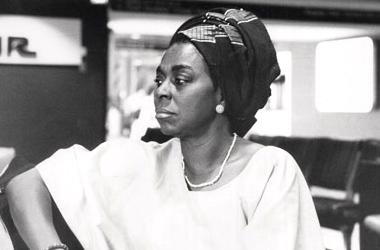Zulu Sofola was a matriarch of Nigerian theatre and the first Nigerian female playwright to be published. She was Africa’s first female Professor of Theatre Arts and a true embodiment of the essence of African womanhood.
Early Life and Education
Onuekwuke Nwazuluwa Okwumabua was born on June 22, 1935, in Issele-Uku, Anochia North LGA Delta State, to Nwaugbade Okwumabua and Chief Ogana Okwumabua. She attended the Federal Government Primary School in Asaba and the Baptist Girls’ High School in Agbor. Her performing talent was recognized by the school’s authorities and she received a scholarship to complete her high school education in Nashville, Tennessee in the USA.
Sofola earned a Bachelor of Arts degree cum laude in English from Virginia Union University in Richmond, Virginia in 1959. She completed her post-graduate studies and eventually obtained a Master of Arts degree in Drama (Playwriting and Production) from the Catholic University of America in Washington, DC in 1966. In 1977, she completed her Ph.D. in Theatre Arts (Tragic Theory) at the University of Ibadan.
Career and Writing
Sofola was an accomplished theatre director and musician. She produced both stage and television plays. She published fifteen plays, including The Deer and The Hunters Pearl (1969), Eclipso and the Fantasia (1990), King Emene (1974), Memories In the Moonlight (1986), Old Wines Are Tasty (1973), The Operators (1973), The Showers (1991) and The Wizard of the Law (1975).
Her plays criticize the ill-treatment of women in African societies and wider social injustices. Some of her critics classified her as “a liberal feminist,” but she was praised as a writer who sought justice for all. She believed that “a person should be treated not on the basis of gender but purely as a human being worthy of respect”. Her play Wedlock of the Gods (1972) questions the traditional notion that “a man’s daughter is his source of wealth.”
Other social ills that Sofola addressed in her works include the political cruelty of military dictatorships, often through the use of satire.
Sofola’s writing style is simplistic and employs beautiful imagery. She shared her knowledge of Nigeria’s history and traditions and present circumstances, particularly as they related to women. Her knowledge of her identity and pride in her heritage is reflected in her plays, a number of which portrayed Issele-Uku culture. For example, the name “Mother Mkpitime” (given to a goddess in the play King Emene) was derived the name from a lake close to her hometown. Sofola also gave her characters names from her hometown.
Awards and Achievements
Sofola received many scholarly awards and distinctions both nationally and internationally. She was the first woman to hold the Chair and Headship of a theatre department as the Head of the Department of the Performing Arts of the University of Ilorin. She was a recipient of a Fulbright Scholarship, through which she studied at the State University of New York in Buffalo, New York in 1988. In that same year, she represented Nigeria at the first International Women Playwrights Conference.
In 2002, the National Prize for Creative Writing was named after her. Sofola’s plays are read and performed across Europe, North and South America, and Africa. Her message of fair treatment to all human beings helped shape the work of human rights advocates in Nigeria. She left an indelible mark on contemporary playwrights and the field of social justice.
Sofola met and married her college sweetheart Adeyemi Sofola while she was a student in Washington, DC. They had five children together.
Death
Sofola died on September 5, 1995, nearly six months after her husband passed on.
Sources
- The Official Website of Zulu Sofola
- Y. Olakitan. (2010, March 19). Remembering Zulu Sofola: Great woman of theatre. The Guardian. Retrieved from here.
- Wikipedia
Picture sources: The Official Website of Zulu Sofola and Bombastic Element


